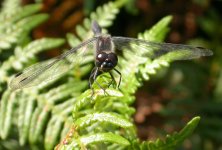steve covey
Jack of all Orders - Master of None
Hi all,
this thread just brought to my attention [thanks Ken]. The vernacular name Large White-faced Darter has been suggested by the British Dragonfly Society [BDS] in their list of proposed names which was published in Issue 23 of Atropos [last autumn]. I was expecting a lot of controversy as a result of this but there seems not to have been too much 'fighting' over names. No where near as much as was generated when bird name changes were proposed. This is no doubt due to the fact that there are a lot less people interested in the Odonata than there are birdwatchers. My own personal view is that in a European context the scientific names are the key elements then at least everyone, whether they come from UK, Scandinavia, central Europe or the Med all know what is being talked about.
The adoption of English vernacular names is perceived to be useful in trying to attract more 'lay persons' to become interested in odonata and I can sympathise with that view. On the other hand when I started my interest in dragonflies it was only really the scientific names that were in general use and so I just learnt them. When alls said and done learning and remembering a name is the same whether it is in English or Latin/Greek. But that's just my view - what do others think?
Sorry I've been long-winded but I hope others find it an interesting enough topic to reply.
Just out of interest, still seeing Migrant Hawker [Aeshna mixta], Common Darter [Sympetrum striolatum] and Black Darter [S. danae] about in reasonable numbers in the North Wilts/Berks area. Have attached a pic of the 'business end' of a Black Darter.
Cheers,
Steve.
this thread just brought to my attention [thanks Ken]. The vernacular name Large White-faced Darter has been suggested by the British Dragonfly Society [BDS] in their list of proposed names which was published in Issue 23 of Atropos [last autumn]. I was expecting a lot of controversy as a result of this but there seems not to have been too much 'fighting' over names. No where near as much as was generated when bird name changes were proposed. This is no doubt due to the fact that there are a lot less people interested in the Odonata than there are birdwatchers. My own personal view is that in a European context the scientific names are the key elements then at least everyone, whether they come from UK, Scandinavia, central Europe or the Med all know what is being talked about.
The adoption of English vernacular names is perceived to be useful in trying to attract more 'lay persons' to become interested in odonata and I can sympathise with that view. On the other hand when I started my interest in dragonflies it was only really the scientific names that were in general use and so I just learnt them. When alls said and done learning and remembering a name is the same whether it is in English or Latin/Greek. But that's just my view - what do others think?
Sorry I've been long-winded but I hope others find it an interesting enough topic to reply.
Just out of interest, still seeing Migrant Hawker [Aeshna mixta], Common Darter [Sympetrum striolatum] and Black Darter [S. danae] about in reasonable numbers in the North Wilts/Berks area. Have attached a pic of the 'business end' of a Black Darter.
Cheers,
Steve.




